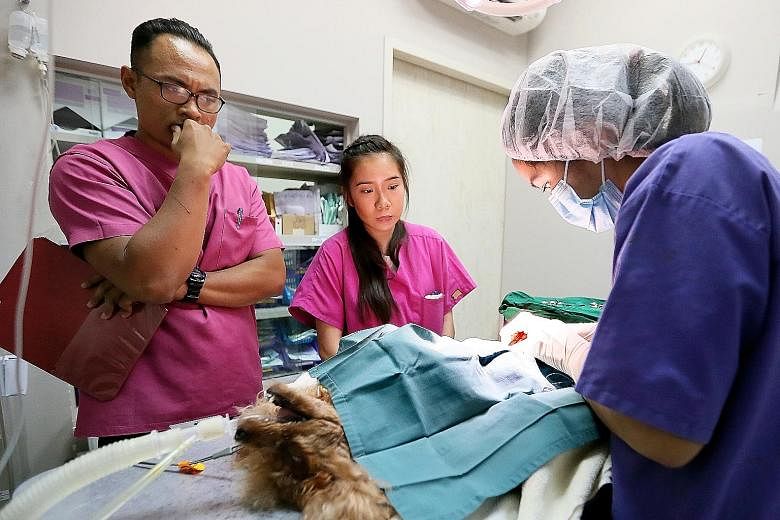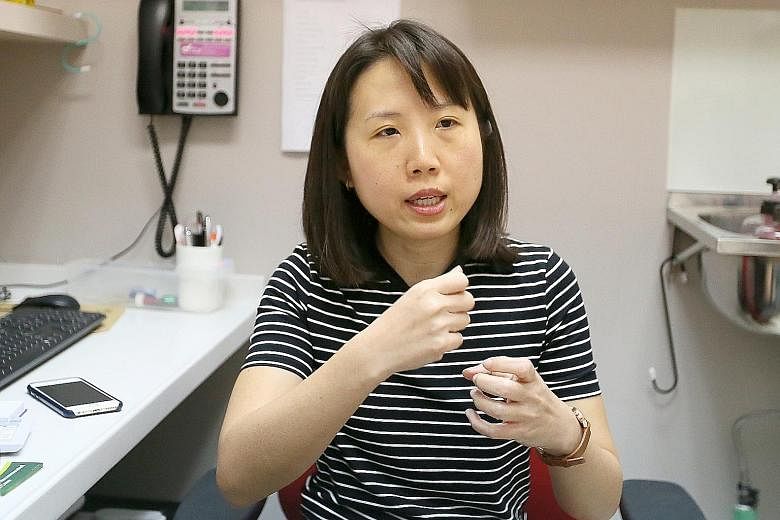Since his childhood, Muhammad Arfian Mohamed Hanafi has wanted to work with animals. But his parents advised him to choose a future they believed would offer more security.
Mr Arfian, 23, relented and completed a biotechnology diploma course in Singapore Polytechnic, though his desire never went away.
While completing his national service, his best friend, Mr Darren Lim, told him of a junior vet technician vacancy at Allpets & Aqualife Clinic.
Mr Lim, 23, knew its co-owner Frederic Chua and connected Mr Arfian with the clinic.
Mr Arfian said: "When I saw this opportunity, I grabbed it."
He had no skills directly relevant to the veterinary care industry but his attitude won over his soon-to-be bosses.
Dr Winnie Teo - the clinic's other co-owner - was impressed with his honesty and passion.
"He appeared very earnest during the interview, he was very enthusiastic... I didn't feel like I had to second-guess him," Dr Teo said.
She recommended that he join the veterinary care industry's SkillsFuture Earn and Learn Programme (ELP), which is conducted by Ngee Ann Polytechnic (NP).
The one-year programme would allow him to draw a full salary from the clinic while taking night classes to deepen his veterinary knowledge, ending with a specialist diploma in veterinary clinical practice.
It aims to tackle the shortage of workers in the pet sector by opening doors to those who did not pursue a veterinary-related education.
"He did very well during the interview... We thought, 'Why not give this young man a chance to go for this course?'" said Dr Teo.
Mr Arfian explained why he eagerly took up the offer. "It would give me a complete and better understanding of what I do here so I can become better at my work."
The specialist diploma was launched in October with 17 students. Seven of them, including Mr Arfian, are ELP participants.
Almost four months in, they are already reaping the benefits.
Ms Enrica Cheng, another Allpets & Aqualife Clinic employee taking part in the programme, said: "Before (the ELP), I would never intubate the dogs."
The 22-year-old was referring to the act of placing a tube into an anaesthetised animal's windpipe.
It carries oxygen and anaesthetic gases, keeping the animal alive during surgery.
"I would be very scared - what if I tear something? Then it'd be my fault." However, after NP taught her about a dog's internal anatomy, she became more confident.
The nervousness she initially felt might surprise some. Unlike Mr Arfian, she is no rookie and will mark her second year at the clinic next month.
But her beginnings are similar to his, as she graduated from Republic Polytechnic with a biotechnology diploma.
She felt her lack of veterinary education held her back despite her practical experience, so she joined the ELP.
"I didn't want to be stagnant in terms of knowledge," said Ms Cheng. "I thought I could learn more beyond the clinic."
Dr Teo said putting Ms Cheng and Mr Arfian on the ELP - and paying $650 for each employee - was the right decision. "I think the ELP has given them some confidence and a better, deeper understanding of what they're doing."
She will increase their pay after they complete the programme.
Clinics that send employees for the ELP get up to $15,000 in government grants per participant.
Dr Teo revealed that job applications spiked after the programme was introduced, and suspected these applicants hoped to use her clinic to get into the programme.
It is clear, however, that both the clinic and its workers benefit, as Dr Teo said she would enrol more employees in the ELP.
And what do Mr Arfian's parents think now? He initially told them that he was working in a "clinic".
When they found out it was a vet clinic, they were not happy.
But knowing the love he has always had for animals, they gradually came to accept his decision.
Said Mr Arfian: "My mum frequently asks if I have attended to any cute cats so that's how I know they're okay with it."
As of last August, there were 37 ELPs across 22 sectors.



